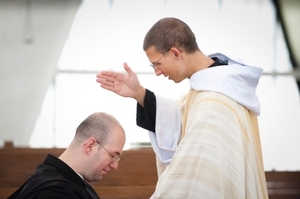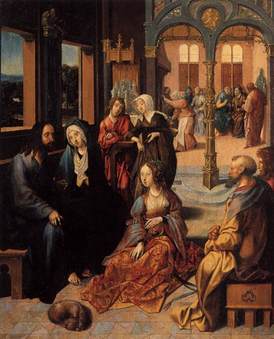 In midst of burning desert heat
In midst of burning desert heat
Three strangers came along the way
Where Abraham and Sarah stayed;
He saw them, and begged them to stay.
In hospitality, he sought
To care for each and ev’ry need;
In answer came the promise sweet:
“Your wife will bear a son, indeed.”
In much the same way, Jesus came
To Martha and to Mary’s place;
While Mary sat and heard the Lord,
All awed by such amazing grace,
Her sister called, rebuking her
And scolded Christ for lack of care.
But Jesus said, “What Mary chose
Alone is needful, and most fair.”
In giving hospitality,
We serve our God in neighbor’s guise;
The trouble others seem to be
Will oft be Christ, to our surprise;
And yet the one thing needful is
The mystery of Christ in all,
Our hope of glory. Here we sit
And hear our Master’s loving call.
Responding to an Episcopal priest on giving communion to a dog
The other day I made a post on this blog about a Canadian
woman priest giving Communion to a dog. A reader of the Communio blog, Lydia
wrote to me saying:
I am a priest in the Episcopal Church in the US.
The Anglican Communion does not have priestesses. I am sure that you know
that. Perhaps you are just being sarcastic.
Personally, I would rather have my
Church known for giving communion to a dog than for the fact that many of my
priests molested children, in countries all over the world, and that
my Bishops did all that they could to ignore complaints about the abuse,
to hide the problem, and to protect the offending clergy.
My response to Lydia
The dictionary defines a priestess as a female priest. It’s a perfectly good
English word; in fact, the Anglican C.S. Lewis wrote an essay called, “Priestesses
in the Church.” If the word “priestess” has a strangely non-Christian
sound, perhaps that is because in churches that claim apostolic succession,
there is no precedent for female priests. As Lewis pointed out, there have been
many religions with female priests (priestesses), but these religions are very
different from Christianity as it has been known for 20 centuries.
In any case,
the word “deaconess” is not considered offensive, so why should
“priestess” be so considered? If masculine imagery for divine transcendence
needs to be balanced by feminine imagery of divine immanence, why not say that
priest and priestess together represent the divine more fully, like Yin and
Yang? My impression is that many modern Anglicans (including women
clergypersons) think on those lines. So why fight about the sound of a word
when its substantive meaning is considered OK?
As for the Catholic Church being
“known for” molestation of children and minors: well, the Anglican
Church in Canada and Australia has been racked by similar problems, particularly
in residential schools, with some dioceses being nearly bankrupted. I am saddened
by the Anglicans’ troubles since the attacks on their schools is an indirect
form of anti-Christian persecution at the hands of a hostile state. As such,
this abuse hysteria threatens us all because it is premised on the assumption
that the sins of a few abusive clergy should be avenged on the entire Body of
Christ. In the case of any other group besides the clergy, this would be
considered unjust prejudice and overreaction.
Statistically speaking, Catholic
priests are no more likely to molest than ministers of other religions; it’s
just that we are a much larger church and that our dioceses are legally set up
as a corporation sole, thus inviting crippling lawsuits and lots of bad
publicity. That said, I do agree that we Catholics are not in a position to
cast any stones on the sexual abuse issue. And so this blog has not done so.
Gross
liturgical abuses and irreverence are a different sort of issue. These
liturgical-sacramental aberrations are public acts done in an official
capacity, not secret sins or obvious crimes. And, in fact, I do emphatically
criticize and abhor similar liturgical abuses among Catholics and wish that
more Catholic parishes had the reverence and decorum to be found in many
high-church Episcopal parishes. It’s not a matter of either side of the
Reformation divide being free of sin or failure: it’s just that without an
authoritative center of communion and teaching and practice, Anglicanism can’t
easily set any parameters for legitimate diversity within itself. And
Archbishop Williams himself would sadly admit that that is unfortunately the
case.
Cremation and the Catholic Church
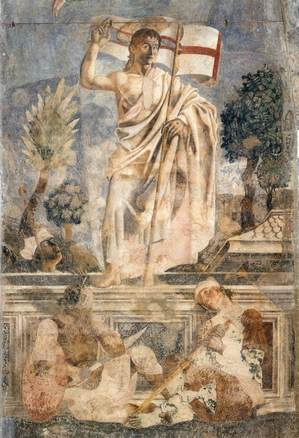 Catholics today are choosing cremation over the burial of the body. The numbers are on the increase in recent years due to economic reasons, perceived ecological concerns space limitations in some places. But are these good reasons to chose cremation of the body? The Church’s allowance of cremation is given by exception with a strong preference for the entombment of the body (either in the ground or a masoleum). Why? Principally because cremation does not fully express a Christian’s belief in the Resurrection of the body on the Last Day.
Catholics today are choosing cremation over the burial of the body. The numbers are on the increase in recent years due to economic reasons, perceived ecological concerns space limitations in some places. But are these good reasons to chose cremation of the body? The Church’s allowance of cremation is given by exception with a strong preference for the entombment of the body (either in the ground or a masoleum). Why? Principally because cremation does not fully express a Christian’s belief in the Resurrection of the body on the Last Day.
ENDOW: a new Feminism Catholic style
 ENDOW (Educating on the Nature & Dignity of Women) is a Catholic educational program bringing women together to discover what it means to be a woman, made in God’s image and likeness holding a God-given dignity known in being a person. ENDOW is a new feminism promoting the beauty of being a woman.
ENDOW (Educating on the Nature & Dignity of Women) is a Catholic educational program bringing women together to discover what it means to be a woman, made in God’s image and likeness holding a God-given dignity known in being a person. ENDOW is a new feminism promoting the beauty of being a woman.
Is our love enlarged enough to trust the other?
The work of holiness is supposedly on our lists of things “to do.” Yet, we bounce from thing to thing, place to place, guru to guru without considering the true source of holiness and how holiness develops. Yes, it is a work but it is not something imposed on us by an external force. As St Gregory of Nyssa once said, “For the quality of holiness is shown not by what we say but by what we do in life.” No gift can be imposed on someone, neither from God nor from another. We can never take a gift but only be open to receiving a gift. This is particularly true in meeting God and a friend.
us is so low, why our attachments are so poor, our view of life so dim, our
belief so unreal, our general notions so artificial and external is this, that
we dare not trust each other with the secret of our hearts. We have each the
same secret, and we keep it to ourselves, and we fear that, as a cause of
estrangement, which really would be a bond of union. We do not probe the wounds
of our nature thoroughly: we do not lay the foundation of our religious
profession in the ground of our inner man: we make clean the outside of things:
we are amiable and friendly to each other in words and deeds, but our love is
not enlarged, our bowels of affection are straightened, and we fear to let
intercourse begin at the root: and in consequence, our religion viewed as a
social system is hollow, the presence of Christ is not in it. (Plain and
Parochial Sermons, V, pp. 126-7).
The priest is a fighting man
Preaching the first Mass of a newly ordained member of his monastic community, Benedictine Father Ambrose Bennett cited “Emmanuel Cardinal Suhard, who served as Archbishop of Paris
in the post-war years, expressed this mystery [of the priesthood] very eloquently in a beautiful
pastoral letter that he wrote to his priest on Holy Thursday of 1949:
At the altar, the priest, like
Christ, is the [sacrificial] victim. But he is also the sacrificer; he is then
the dreadful man, the one who works death, the one who slays sin and burns it,
the one who is crucified and who crucifies, the one who cannot save the world,
nor will consent to its salvation, save through nailing it to the Cross.
“Without the shedding of blood there is no redemption” (Heb. 9.22)… That is why
the priest in relation to society must always be somehow or other its
adversary. He will never be forgiven for recalling and perpetuating, from
generation to generation, Christ, whom they thought they had suppressed
forever… Far from being a fatherly adviser or a good-natured citizen, a priest
is, like God, a terrible being. He is a fighting man… Like Saint Michael, he
challenges the Dragon, dragging him out of ambush by healing men’s hearts, so
as to crush one by one his ever resurgent heads. Although it is too frequently
overlooked, a priest is an exorcist…; he has the power and the duty of
expelling the Devil (Cardinal Suhard, Priests Among Men, pp. 82-83; 44-45).
Church of Canada priestess gives communion to a dog
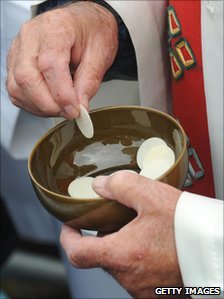 AND you wonder why fewer and fewer people take the Anglican Church (or the Episcopal Church if you are American) with a degree of seriousness. Recently a Church of Canada priestess gave communion to a German Shepherd as a “simple church act of reaching out.” What a gesture of welcome! This act is not only contravening “church policy” as much as it is an acknowledgement that the real Presence of Christ is not a Reality for these people. Policy is has nothing to do with it, does it? But if the Anglicans of the Church of Canada simply believe Communion is a symbol or that it represents something else…. Sounds like Joseph Campbell, Derida and many Protestant theologians (e.g. Borg, Tillich and Bultmann) are patron saints of mere symbol and not of Jesus Christ, body and blood, soul and divinity.
AND you wonder why fewer and fewer people take the Anglican Church (or the Episcopal Church if you are American) with a degree of seriousness. Recently a Church of Canada priestess gave communion to a German Shepherd as a “simple church act of reaching out.” What a gesture of welcome! This act is not only contravening “church policy” as much as it is an acknowledgement that the real Presence of Christ is not a Reality for these people. Policy is has nothing to do with it, does it? But if the Anglicans of the Church of Canada simply believe Communion is a symbol or that it represents something else…. Sounds like Joseph Campbell, Derida and many Protestant theologians (e.g. Borg, Tillich and Bultmann) are patron saints of mere symbol and not of Jesus Christ, body and blood, soul and divinity.
Nuns land record deal
 The Benedictine nuns of the French abbey of Our Lady of the Annunciation of Le Barroux (near the famed Avignon) landed a music contract with Universal Music. This is the same label as Lady Gaga and Elton John.
The Benedictine nuns of the French abbey of Our Lady of the Annunciation of Le Barroux (near the famed Avignon) landed a music contract with Universal Music. This is the same label as Lady Gaga and Elton John.
Father Lawrence Boadt, CSP, RIP
 Paulist Father Larry Boadt, 67, died Saturday after a long illness.
Paulist Father Larry Boadt, 67, died Saturday after a long illness.
Saint James the Greater (Santiago)
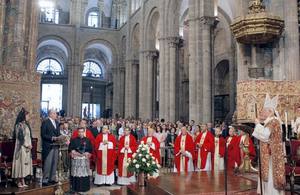 Almighty Father, by the martyrdom of Saint James You blessed the work of the early Church. May his profession of faith give us courage and his prayers bring us strength.
Almighty Father, by the martyrdom of Saint James You blessed the work of the early Church. May his profession of faith give us courage and his prayers bring us strength.
